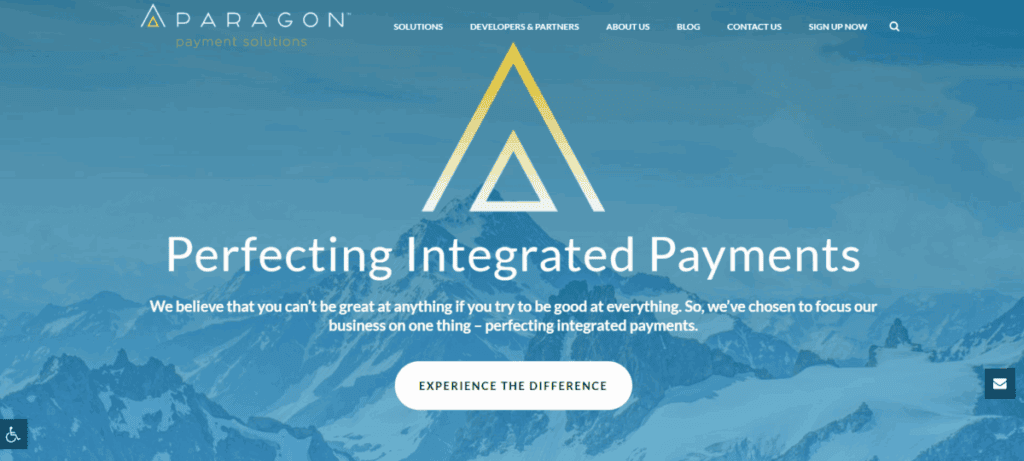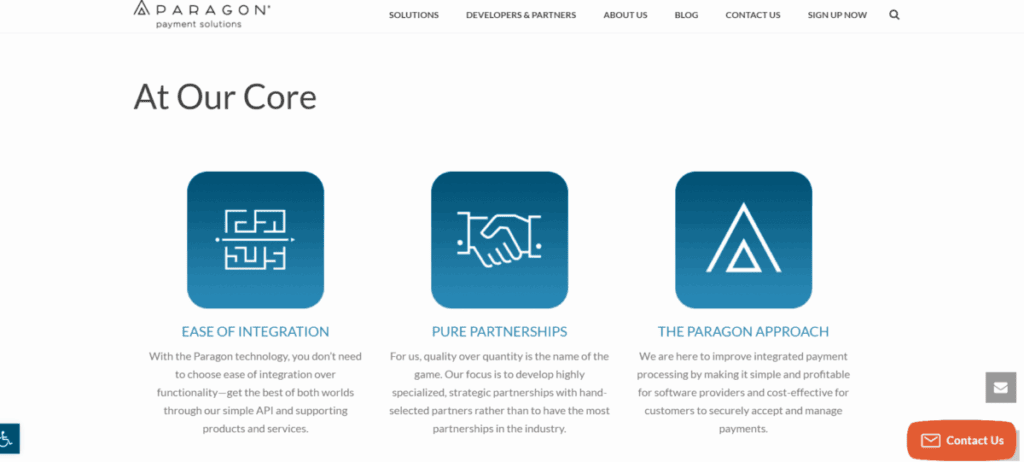
Paragon Payment Solutions Review
- 04th Jul, 2025
- | By Linda Mae
- | Reviews
Paragon Payment Solutions is a payment processor that serves Independent Software Vendors and software-driven platforms. Based in the US, they offer embedded payment solutions to be dropped into third-party software systems. They are for companies that want to own the payment experience within their product, not rely on external providers. Lets read more about Paragon Payment Solutions Review.
Not a mainstream processor for individual merchants or local retailers, Paragon has built their business by focusing on the technical and commercial needs of software companies. They are a strategic partner, offering tools for payments and revenue generation through monetization options for ISVs. Their model is around payment acceptance within software interfaces.
This focused approach means Paragon operates in a niche but growing part of the payment ecosystem. As more SaaS platforms, ERPs and vertical specific applications want to embed payments, Paragon positions themselves as the backend enabler. This allows developers to deliver branded, secure and scalable payment workflows to their own users.
Paragon’s name won’t appear in typical merchant processor comparisons but for businesses that want payment solutions in their proprietary platforms, they have a focused and structured proposition. However, not ideal for standalone merchants or retailers who don’t need deep integration with their own software systems.
Core Offerings and Services | Paragon Payment Solutions Review
Paragon Payment Solutions offers a full suite of services focused on embedded payments. Their services are for ISVs and software developers to integrate secure and scalable payment acceptance into their applications.
One of the key services is merchant processing. Paragon supports all types of transactions, credit card payments, ACH transfers and recurring billing. This allows platforms to offer flexible payment options to their end users, one-time or subscription models. They also offer payment gateway solutions for omnichannel environments, in-person and online transactions.
Paragon’s white-label capabilities are a big differentiator. Software vendors can use the platform while maintaining their own brand. Users never leave the application or see third-party branding when making a transaction. It creates a seamless user experience and allows developers to build trust within their ecosystem.
Additional services include fraud prevention tools, tokenization and secure data storage, all necessary for compliance and risk management. Their reporting tools are also for software partners, transaction insights, settlement data and API accessible analytics. Paragon is not just payment acceptance, it’s enabling software platforms to create an end to end commerce experience for their users. This adds depth for platforms that need more than just payment functionality. But for businesses looking for plug and play solutions may find Paragon’s integration too much for their needs.
Focus on Integrated Payments for ISVs
Paragon’s primary value lies in its ability to support Independent Software Vendors with deeply embedded payment infrastructure. The company tailors its entire platform around enabling software providers to offer payment functionality natively within their applications, avoiding the need for third-party gateways or disjointed user experiences.
The integration process is designed to be developer-friendly. Paragon provides APIs, SDKs, and webhooks that allow developers to control payment functions, user onboarding, and reporting within their own software environments. The result is a highly customizable payment layer that looks and feels like a part of the ISV’s product, not an external add-on.
One of the most important benefits Paragon offers to ISVs is the ability to monetize payments. Through various partnership models, software providers can share in the revenue generated from processing fees, turning what was once a cost center into a potential income stream. This is especially attractive for SaaS providers and vertical-specific platforms that want to expand revenue without raising subscription prices.
Paragon also supports the ISV onboarding process, including merchant approvals and underwriting. This reduces friction for the ISV’s clients and enables a faster go-to-market for software solutions with embedded payments.
For ISVs, Paragon offers a level of flexibility and support that general-purpose processors may not provide. However, this model may not suit companies that lack in-house development resources or that prefer off-the-shelf solutions. The success of integration depends on the ISV’s technical maturity and desire to control the payment experience.
Payment Gateway Technology and Infrastructure
Paragon’s payment gateway serves as the core infrastructure powering its integrated payment solutions. It supports a wide range of transaction types, including card-present and card-not-present payments, ACH transactions, and recurring billing. The gateway is designed to support omnichannel commerce, making it suitable for ISVs whose customers operate both online and in-person.
The system architecture emphasizes flexibility and reliability. Paragon uses tokenization to securely store customer payment data, which enhances compliance and enables repeat transactions without exposing sensitive cardholder information. This is particularly useful for platforms with subscription models or frequent repeat billing.
Security is a critical part of Paragon’s infrastructure. The company maintains PCI DSS Level 1 compliance and supports additional layers of protection such as P2PE and fraud detection filters. These tools allow ISVs to build trust with their end users and reduce liability in the event of data breaches or fraud attempts.
The gateway also includes developer support features like testing sandboxes, documentation, and webhook configurations. These tools give ISVs control over payment workflows, notifications, and error handling. Paragon’s approach favors customization and performance tuning, rather than prebuilt, rigid templates.
While the gateway is robust, it may require technical resources to fully implement. This could present a challenge for smaller ISVs or businesses with limited engineering staff. Still, for platforms seeking to build a branded, secure, and reliable payment experience, Paragon’s gateway infrastructure offers the necessary tools and performance to do so effectively.
Pricing and Fee Transparency
Paragon Payment Solutions does not publicly disclose its full pricing structure on its website, which is typical for B2B processors focused on ISVs. Pricing is often customized based on the software partner’s needs, transaction volume, and the monetization model chosen. This means there may be variability in cost depending on how the integration is structured.
That said, Paragon is known to offer interchange-plus pricing models, which are generally considered more transparent and fair compared to flat-rate or tiered pricing. With interchange-plus, businesses pay the actual card network fee plus a small markup. This model benefits high-volume merchants or platforms seeking clarity on their processing costs.
For ISVs, Paragon provides opportunities to share in the revenue from processing fees through partner agreements. This revenue-sharing model can be particularly attractive for SaaS providers and vertical software companies, as it enables them to generate recurring income from their client transactions.
Paragon does not lock clients into long-term contracts with steep penalties, but it is important to review any service agreements for early termination clauses, PCI compliance fees, or minimum monthly charges. Since each arrangement is bespoke, businesses should conduct thorough due diligence and ask for clear breakdowns before committing.
Overall, the pricing approach reflects Paragon’s customized service model. While this flexibility is a strength, it also means potential clients need to engage in detailed consultations to understand their true cost. For companies that prioritize predictable pricing, this could require some additional upfront effort.
Developer and Technical Support
Paragon places a strong emphasis on developer support, which is essential for ISVs integrating payments into their software platforms. The company provides robust API documentation, sandbox environments for testing, and dedicated technical support resources that guide partners through the implementation process.
One of the key benefits is that Paragon’s APIs are REST-based and offer a high level of customization. This gives developers significant control over how payment workflows are designed and how data is handled. Developers can manage tokenized payment methods, create custom checkout experiences, and control user onboarding; all from within the software’s native interface.
Paragon also offers direct access to integration specialists who can help troubleshoot implementation issues or guide architectural decisions. For companies launching payments within a larger product roadmap, this type of technical support is critical to avoiding bottlenecks.
In addition to implementation support, It provides ongoing technical assistance. This includes regular API updates, release notes, and system monitoring alerts. Their focus on continuous support helps ISVs maintain secure, high-performing environments even as their user base scales.
The level of support and customization makes Paragon ideal for teams that have development resources and want fine-tuned control over the payment stack. However, for businesses looking for simple plug-and-play integrations with limited customization, the setup and maintenance may be more involved than necessary.
Security, Compliance, and Risk Management
Security and compliance are integral to Paragon’s value proposition. The company maintains PCI DSS Level 1 compliance, which is the highest standard for secure payment processing. This ensures that all customer data is handled according to industry best practices, reducing risk for both ISVs and their end users.
Paragon supports tokenization, which replaces sensitive card data with secure tokens that can be stored and used for future transactions. This greatly limits the exposure of actual card numbers and enhances security for recurring billing or stored payment methods. Additionally, point-to-point encryption is used to protect data as it moves between devices and servers, offering another layer of protection.
Fraud detection tools are available through Paragon’s platform, including transaction filters, velocity checks, and customizable rules. These features help reduce chargebacks and fraudulent activity, which is particularly important for ISVs managing large networks of merchants or users.
Paragon also assists with compliance documentation and can provide tools or support for merchants to achieve their own PCI compliance. This is a valuable service, especially for software vendors whose clients may not be familiar with payment security requirements.
For higher-risk verticals or software serving regulated industries, It offers risk analysis and underwriting guidance. However, it is not primarily designed to serve high-risk businesses such as firearms or CBD retailers.
In sum, Paragon’s risk and compliance tools are strong and align well with the needs of software platforms. They allow ISVs to operate securely while offering a frictionless experience to their users.
Customer Support and Service Quality
Paragon emphasizes a personalized, relationship-based approach to customer support. Unlike large-scale processors where support may be limited to online ticketing or long wait times, It offers direct access to account managers, integration specialists, and customer service representatives.
Support channels typically include phone, email, and dedicated support portals for technical assistance. During onboarding and implementation, ISVs are often paired with support personnel who can help guide them through the entire process; from contract setup to sandbox testing and go-live support.
What differentiates Paragon is its dual-layer support structure. ISVs receive support not only for their own technical integration but also for onboarding and managing their downstream merchants. This can be particularly useful for SaaS platforms that want to minimize customer service demands related to payments.
Reviews of Paragon’s service quality tend to highlight responsiveness and thoroughness, although experiences can vary depending on the complexity of the integration. Some ISVs may appreciate the white-glove treatment, while smaller companies may find the onboarding process more involved than with simpler processors.
Ongoing support includes regular communication, API update notifications, and assistance with reporting or settlement issues. While not a 24/7 support operation, Paragon’s business-hour coverage is generally considered effective for its target market.
Businesses that value high-touch service and reliable support will likely find Paragon’s approach favorable. However, those expecting instant responses during off-hours or fully self-service support may need to evaluate their expectations.
Pros and Cons of Paragon Payment Solutions
Paragon Payment Solutions offers a custom platform for software vendors and integrated payments. Its focus on embedded payment experiences, monetization options for ISVs, and technical support are some of its highlights. For companies that need a white-label solution and control over the user experience, Paragon is the way to go.
Another big plus is its commitment to security and compliance. With PCI DSS Level 1 certification, tokenization, and encryption, It gives you enterprise-grade protection without complicating the integration. Recurring billing, ACH, and in-person transactions are also supported.
But Paragon may not be for every business. Its model is best for ISVs and companies that don’t have in-house development capabilities may find the setup too complex. No publicly available pricing means more upfront work during evaluation.
Also, while Paragon is customizable, it may not have as many prebuilt features or templates as more mainstream processors like Stripe or Square. That’s a trade-off between flexibility and simplicity to consider.
Ultimately, Paragon’s strength is in integration depth and partner-centric service. It’s not a universal processor but a specialized provider for software platforms with the technical resources and strategic interest in controlling payments.
Ideal Business Types for Paragon
Paragon is best for Independent Software Vendors, SaaS platforms, ERP providers, and vertical-specific applications that want to embed payments into their user experience. These businesses benefit from the platform’s flexibility, monetization potential and branded payment workflows.
Healthcare software, education platforms, membership management tools and property management systems are particularly well-suited to Paragon’s model. Any business that manages transactions through a proprietary interface and wants to streamline billing, invoicing and settlement for its users can find value here.
ISVs that want to generate revenue through payment processing can also find value here. By sharing in transaction fees, software providers can build an additional income stream without compromising user experience.
But Paragon may not be the best fit for small retailers, restaurants or solo entrepreneurs without development resources. These businesses are better served by turnkey solutions that offer POS systems and minimal setup requirements.
Companies that operate globally may also need to verify international capabilities as Paragon is US focused. If global expansion is a priority, this could be a limiting factor. So Paragon is for software companies that want to own, monetize and optimize payments.
FAQs
Q1: Is Paragon Payment Solutions suitable for small businesses without a software platform?
A: It is built primarily for software companies and ISVs. Small businesses without custom software or integration needs may find simpler solutions more appropriate.
Q2: Does Paragon support international payments?
A: It focuses mainly on U.S.-based processing. International support may be limited, depending on gateway setup and regulatory considerations.
Q3: Can ISVs earn revenue through Paragon’s payment platform?
A: Yes, Paragon allows software vendors to monetize their payment flow through revenue-sharing models, creating a new source of income tied to user transactions.



